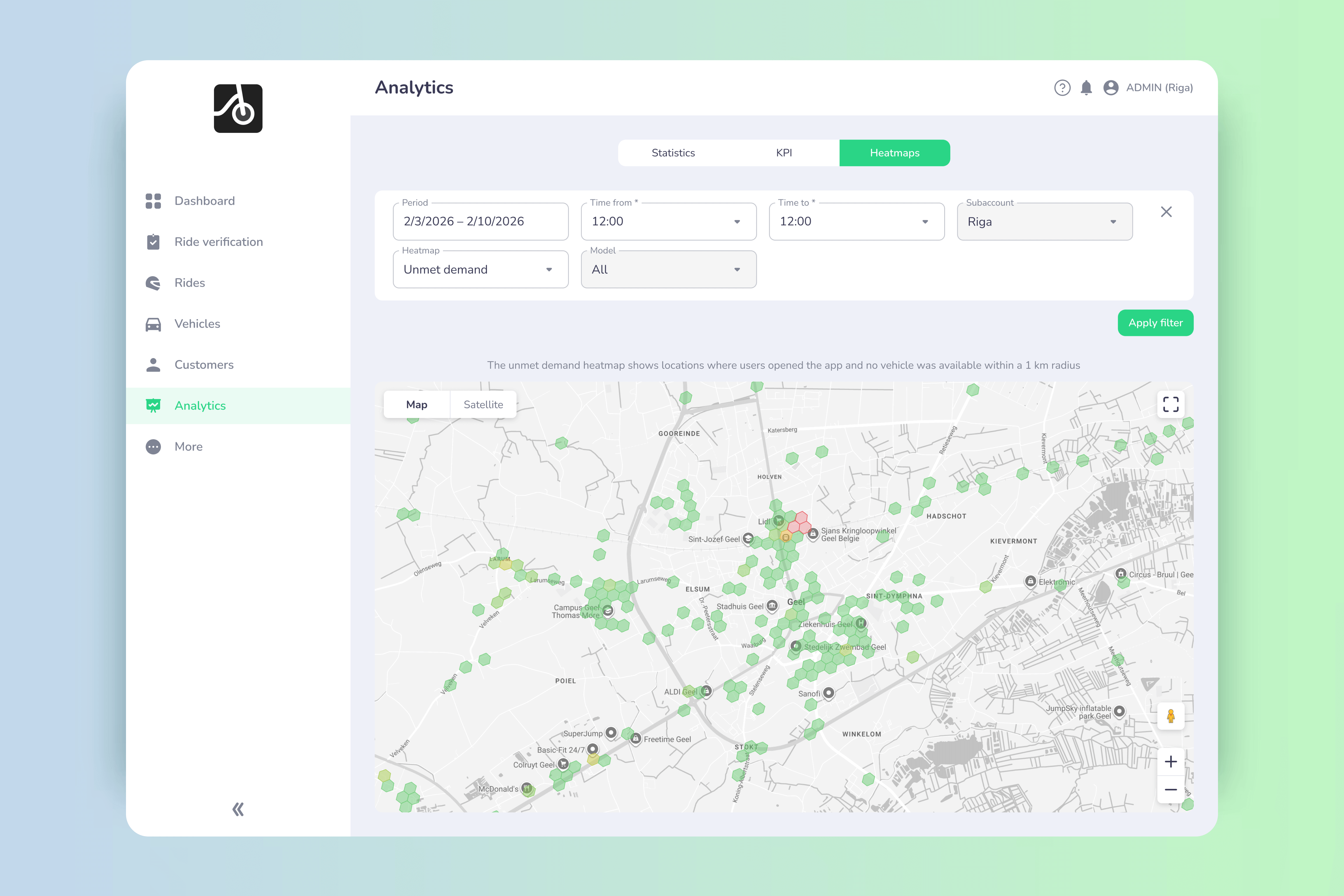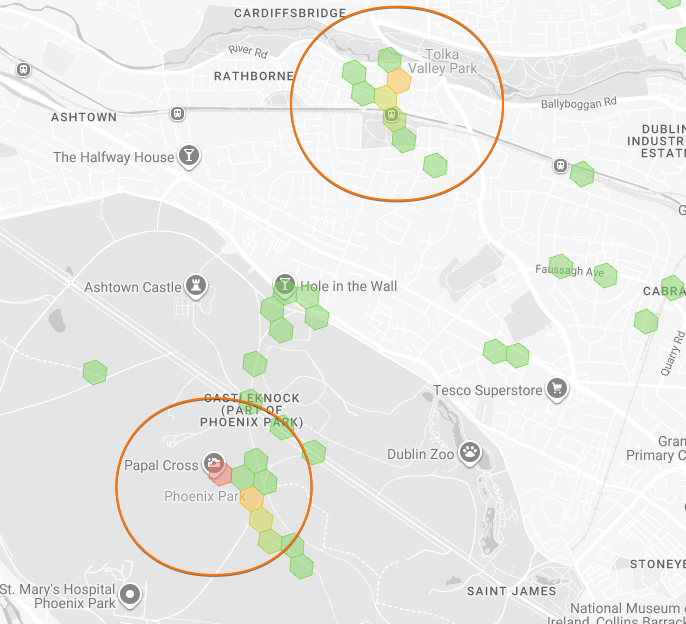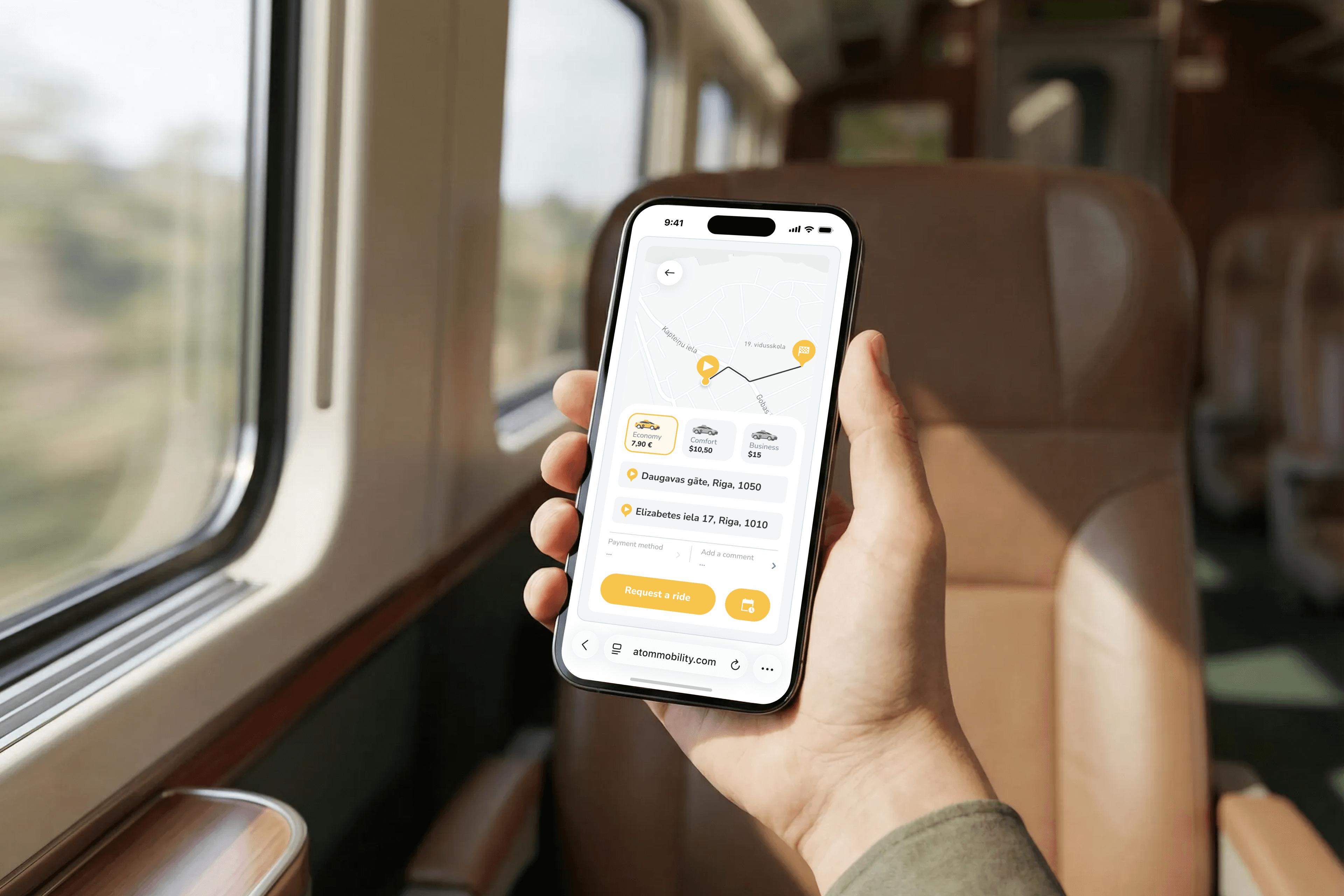
The more help we expect from technologies, the more we should pump it up with data. For example, if we want to know precisely when public transport will be the most crowded or at what time a particular street will have the heaviest traffic, we have to provide algorithms with as much data as possible about people’s movements. If we have enough data sources and information that can be easily shared, then it’s not a problem. Data will help to make our lives easier.
Vehicle sharing and micro-mobility solutions are becoming more popular each year while expanding in more and more cities and countries all over the world. All these platforms and solutions create a certain amount of data. When used properly, it can help to improve everyday life in the city.
MaaS solutions collects data from several service providers
Mobility as a Service (MaaS) providers are a perfect source of data. MaaS solutions integrate various forms of transport services into a single mobility service accessible on demand. These different transport forms include public transport, as well as ride, car, and bike-sharing. In some cases, this might include data about taxis and car rental services.

Source - https://www.trafi.com/jelbi-tender
The idea behind MaaS is that everything is available inside a single application. So there is no need to pay for each service separately. Moreover, there are different payment plans available – a monthly subscription model with a fixed monthly fee or “pay-as-you-go”, where each leg of the booked trip is priced separately.
In 2021 several interesting and significant MaaS partnerships were announced in Europe. One example is the partnership between the public transport company Arriva Nederland (part of Arriva Group, a subsidiary of Deutsche Bahn), and Moovit - the MaaS solutions specialist owned by Intel. This collaboration has made a new nationwide MaaS solution available to employers in the Netherlands with the chance to provide their staff with a mobility budget for their commuting, business, and private journeys. The MaaS app is called Glimble and it is planning to expand in Belgium, as well as in parts of Germany.
Earlier last year, Swiss Federal Railways - public transport operators in Zurich, Basel, and Bern - created a MaaS solution yumuv. It is the first regional MaaS with subscriptions and is powered by Trafi. In less than two months, yumuv was downloaded by almost 1,000 individuals who made nearly 2,000 rides in Zurich alone. Almost 200 subscribers opted for different subscription packages.

https://www.polisnetwork.eu/article/zurich-basel-bern-bring-new-maas-solutions
This graph by the yumuv app shows how much information can be obtained from one source of the MaaS solution. It is possible to follow people’s movement, the most popular routes to get from point A to point B, as well as the choice of the vehicles along the way. So this data is indispensable.
The more the user is willing to share data, the more he gets in return. This case is no exception. With the development of MaaS, users of the solution get more freedom to choose while moving in the city. Basically, the user can decide on its own terms without the need to switch apps or platforms. Various vehicle options and different service providers are available on one unified interface. The choice between the fastest or the cheapest option is behind the user. As everything is integrated into one app (citymapper, Moovit), it is efficient and fast to also include public transport in the trip.
Google Maps and Moovit - on their way to becoming MaaS?
Recently all the biggest players in the micro-mobility market have moved to where most people are looking for commuting solutions. It all started with Bird, Lime, Waybots (Skip), and Spin joining Transit app in April 2018. Afterward, In Europe, CityMapper added the two biggest bike operators Ofo and Mobike in June 2018. Soon after, CityMapper announced several integrations for bike, moped, and scooter operators, such as Jump, Lime (at that time separate), and Nextbike; Spin, and Bird scooters; and Cooltra, Coup, and ZigZag mopeds.
The next big thing that happened was the exclusive partnership between Google Maps and Lime that started at the end of 2018 and lasted 2,5 years. It was the integration for short-distance trips, only eight months after Lime started to provide e-scooter services. The company announced that the app shows scooters and bikes nearby in the “transit” tab, as well as via “walking” and “cycling” tabs. The app displays information about each vehicle - distance, price, and battery range.
Moovit was the first MaaS company to add routes for cyclists and it happened back in 2018. The company started its partnerships with GoTo, Donkey Republic, Mimoto, Mobike and Bird, Circ, Hive, and several others in 2019. Moovit added more partnerships in 2021 - Beryl in February, Beam in May, and Voi, Tier, Spin, and Getaround the following months ending with Lime in July. This latest deal affected 20 countries and 117 cities including the United States, South America, Australia, and Europe.
FreeNow started first with the integration of its own Hive brand (now defunct), as well as VOI, BOND, Emmy, and MILES in 2020. In the first half of 2021, it continued with adding Tier and Cooltra, in 2022 - Zipp Mobility.
With big players constantly joining Google Maps and Moovit, these platforms have become MaaS trip planning solutions. The only difference is that it is not possible to pay for the trip via these services so they are not classical MaaS solutions. However, they offer a huge benefit in the form of an extensive user database, as well as users’ habits to plan their trips via these platforms. More reach means more customers. And another important benefit for micro-mobility service providers using MaaS solutions is cross-promo possibilities.
GBFS data - future of city planning
It is in the interests of many parties involved to make micro-mobility data available, so there are organizations that focus on that. What this means for you as a service provider - you can spend weeks integrating with each app-aggregator such as Google, or you can use the standard approach by GBFS. This offers the opportunity to join any app aggregator (Google, Movit, city apps) in a few days with no coding at all. And it doesn't matter what micro-mobility service you are providing.
What is GBFS? It is a leading global initiative created by NABSA - North America Bikeshare and Scootershare Association. GBFS is General Bikeshare Feed Specification. A team of bike-share system owners and operators, application developers, and technology vendors developed GBFS and it was later adopted by over 600 bike-share and scooter systems worldwide. The latest version was released in April 2021.
GBFS defines a common format to share the real-time status of a shared mobility system. The purpose of data specification is to enable the exchange of information between multiple parties in a manner that ensures that all parties agree on what the information represents. The GBFS format allows mobility data to be used by a range of software applications for trip planning, research, analysis, visualization, and regulation. This publicly available data allows regulators, researchers, and community members to gain insights that have helped municipalities meet their goals.
GBFS includes information about vehicles (bicycles, scooters, moped, and cars), stations, dock locations, and availability. There is also information about vehicle characteristics including their type of power and the distance that can be traveled on the remaining charge. Geofenced areas are also included in this set of information, i.e. data about rules related to speed, parking, and prohibited zones.
So what's in the data available for the city? If we specifically talk about information about cars, it is now possible to quickly convert car trips to electric vehicle trips. Questionnaire data in the US shows that this occurs with approximately 30% of all rides. If this is too specific for you, bear in mind that any insights are potentially going to provide the opportunity to optimize the city’s infrastructure and help to make the city more user-friendly and sustainable. And as we all know, this and any other innovations will most likely help to grow the city’s reputation worldwide.
Click below to learn more or request a demo.

📉 Every unmet search is lost revenue. The unmet demand heatmap shows where users actively searched for vehicles but none were available - giving operators clear, search-based demand signals to rebalance fleets 🚚, improve conversions 📈, and grow smarter 🧠.
Fleet operators don’t lose revenue because of lack of demand - they lose it because demand appears in the wrong place at the wrong time. That’s exactly the problem the Unmet demand heatmap solves.
This new analytics layer from ATOM Mobility shows where users actively searched for vehicles but couldn’t find any within reach. Not guesses. Not assumptions. Real, proven demand currently left on the table.
What is the unmet demand heatmap?
The unmet demand heatmap highlights locations where:
- A user opened the app
- Actively searched for available vehicles
- No vehicle was found within the defined search radius
In other words: high-intent users who wanted to ride, but couldn’t. Unlike generic “app open” data, unmet demand is recorded only when a real vehicle search happens, making this one of the most actionable datasets for operators.
Why unmet demand is more valuable than app opens
Many analytics tools track where users open the app (ATOM Mobility provides this data too). That’s useful - but incomplete. Unmet demand answers a much stronger question:
Where did users try to ride and failed? That difference matters.
Unmet demand data is:
✅ Intent-driven (search-based, not passive)
✅ Directly tied to lost revenue
✅ Immediately actionable for rebalancing and expansion
✅ Credible for discussions with cities and partners

How it works
Here’s how the logic is implemented under the hood:
1. Search-based trigger. Unmet demand is recorded only when a user performs a vehicle search. No search = no data point.
2. Distance threshold. If no vehicle is available within 1,000 meters, unmet demand is logged.
- The radius can be customized per operator
- Adaptable for dense cities vs. suburban or rural areas
3. Shared + private fleet support. The feature tracks unmet demand for:
- Shared fleets
- Private / restricted fleets (e.g. corporate, residential, campus)
This gives operators a full picture across all use cases.
4. GPS validation. Data is collected only when:
- GPS is enabled
- Location data is successfully received
This ensures accuracy and avoids noise.
Smart data optimization (no inflated demand)
To prevent multiple searches from the same user artificially inflating demand, the system applies intelligent filtering:
- After a location is stored, a 30-minute cooldown is activated
- If the same user searches again within 30 minutes And within 100 meters of the previous location → the record is skipped
- After 30 minutes, a new record is stored - even if the location is unchanged
Result: clean, realistic demand signals, not spammy heatmaps.
Why this matters for operators
📈 Increase revenue
Unmet demand shows exactly where vehicles are missing allowing you to:
- Rebalance fleets faster
- Expand into proven demand zones
- Reduce failed searches and lost rides
🚚 Smarter rebalancing
Instead of guessing where to move vehicles, teams can prioritize:
- High-intent demand hotspots
- Time-based demand patterns
- Areas with repeated unmet searches
🏙 Stronger city conversations
Unmet demand heatmaps are powerful evidence for:
- Permit negotiations
- Zone expansions
- Infrastructure requests
- Data-backed urban planning discussions
📊 Higher conversion rates
Placing vehicles where users actually search improves:
- Search → ride conversion
- User satisfaction
- Retention over time
Built for real operational use
The new unmet demand heatmap is designed to work alongside other analytics layers, including:
- Popular routes heatmap
- Open app heatmap
- Start & end locations heatmap
Operators can also:
- Toggle zone visibility across heatmaps
- Adjust time periods (performance-optimized)
- Combine insights for strategic fleet planning
From missed demand to competitive advantage
Every unmet search is a signal. Every signal is a potential ride. Every ride is revenue. With the unmet demand heatmap, operators stop guessing and start placing vehicles exactly where demand already exists.
👉 If you want to see how unmet demand can unlock growth for your fleet, book a demo with ATOM Mobility and explore how advanced heatmaps turn data into decisions.

🚕 Web-booker is a lightweight ride-hail widget that lets users book rides directly from a website or mobile browser - no app install required. It reduces booking friction, supports hotel and partner demand, and keeps every ride fully synced with the taxi operator’s app and dashboard.
What if ordering a taxi was as easy as booking a room or clicking “Reserve table” on a website?
Meet Web-booker - a lightweight ride-hail booking widget that lets users request a cab directly from a website, without installing or opening the mobile app.
Perfect for hotels, business centers, event venues, airports, and corporate partners.
👉 Live demo: https://app.atommobility.com/taxi-widget
What is Web-booker?
Web-booker is a browser-based ride-hail widget that operators can embed or link to from any website.
The booking happens on the web, but the ride is fully synchronized with the mobile app and operator dashboard.
How it works (simple by design)
No redirects. No app-store friction. No lost users.
- Client places a button or link on their website
- Clicking it opens a new window with the ride-hail widget
- The widget is branded, localized, and connected directly to the operator’s system
- Booking instantly appears in the dashboard and mobile app
Key capabilities operators care about

🎨 Branded & consistent
- Widget color automatically matches the client’s app branding
- Feels like a natural extension of the operator’s ecosystem
- Fully responsive and optimized for mobile browsers, so users can book a ride directly from their phone without installing the app
📱 App growth built in
- QR code and App Store / Google Play links shown directly in the widget
- Smooth upgrade path from web → app
⏱️ Booking flexibility
- Users can request a ride immediately or schedule a ride for a future date and time
- Works the same way across web, mobile browser, and app
- Scheduled bookings are fully synchronized with the operator dashboard and mobile app
🔄 Fully synced ecosystem
- Country code auto-selected based on user location
- Book via web → see the ride in the app (same user credentials)
- Dashboard receives booking data instantly
- Every booking is tagged with Source:
- App
- Web (dashboard bookings)
- Booker (website widget)
- API
🔐 Clean & secure session handling
- User is logged out automatically when leaving the page
- No persistent browser sessions
💵 Payments logic
- New users: cash only
- Existing users: can choose saved payment methods
- If cash is not enabled → clear message prompts booking via the app
This keeps fraud low while preserving conversion.
✅ Default rollout
- Enabled by default for all ride-hail merchants
- No extra setup required
- Operators decide where and how to use it (hotel partners, landing pages, QR posters, etc.)
Why this matters in practice
Web-booker addresses one of the most common friction points in ride-hailing: users who need a ride now but are not willing to download an app first. By allowing bookings directly from a website, operators can capture high-intent demand at the exact moment it occurs - whether that is on a hotel website, an event page, or a partner landing page.
At the same time, Web-booker makes partnerships with hotels and venues significantly easier. Instead of complex integrations or manual ordering flows, partners can simply place a button or link and immediately enable ride ordering for their guests. Importantly, this approach does not block long-term app growth. The booking flow still promotes the mobile app through QR codes and store links, allowing operators to convert web users into app users over time - without forcing the install upfront.
Web-booker is not designed to replace the mobile app. It extends the acquisition funnel by adding a low-friction entry point, while keeping all bookings fully synchronized with the operator’s app and dashboard.
👉 Try the demo
https://app.atommobility.com/taxi-widget
Want to explore a ride-hail or taxi solution for your business - or migrate to a more flexible platform? Visit: https://www.atommobility.com/products/ride-hailing


